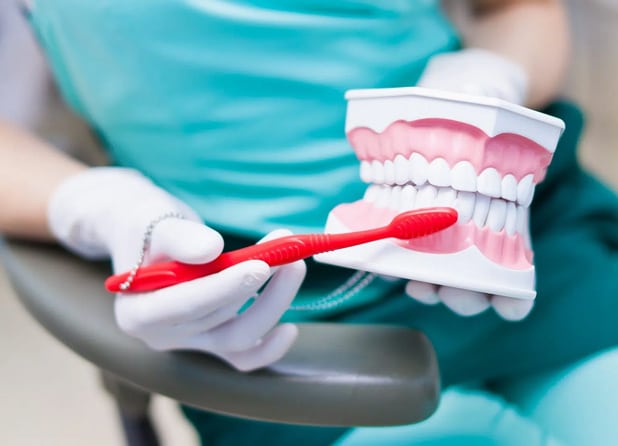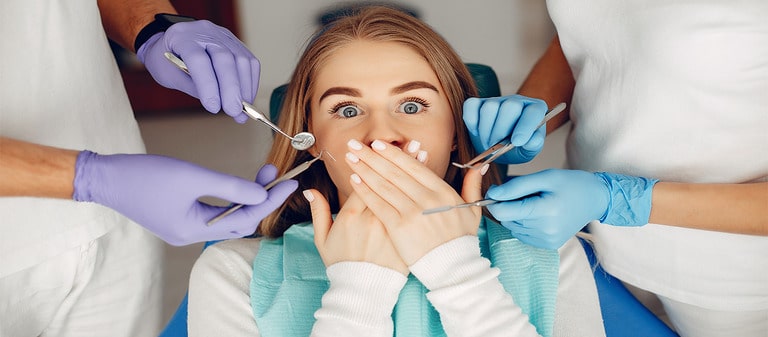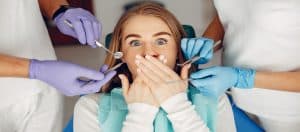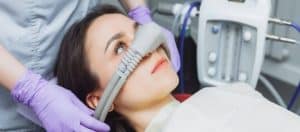Do you frequently skip dental procedures out of fear of anaesthesia or pain? Unfortunately, a lot of people commonly experience this problem. They are so afraid of going to the dentist that they would rather neglect their issues than find a solution.
Your dental visit will be stress-free, comfortable, and relaxing, thanks to sedation dentistry. Additionally, it can make all treatments simple and soothing. Today, the dentist performs all minor to major dental work under Sedation. However, according to your level of anxiety, they choose the types, doses, and application techniques.
The sedation procedure is the best way to ease your anxiety and make you feel calmer and more comfortable while undergoing dental treatments. In this blog, we will discuss the 3 most popular sedative techniques dentists use and how they can help you.
- Inhaled Sedation
Inhaled Sedation is minimal Sedation. In this technique, dentists make patients breathe in a combination of nitrous oxide and oxygen to feel more comfortable and relaxed. It is also known as laughing gas. Patients breathe nitrous oxide throughout the procedure via a mask placed over their noses.
It allows dentists to control the dosage – increase or decrease at any stage of the treatment. In addition, inhaled Sedation wears off quickly as compared to other sedation types. In most cases, a patient will be able to drive home immediately after their treatment is over.
- Oral Sedation
Oral Sedation is commonly used Sedation in dentistry. It involves ingesting medication in the form of pills to relax you. But those who may have trouble swallowing pills, like younger children and patients with special needs, may get oral Sedation in the form of liquid – syrup.
Oral Sedation generally takes some time to show its effect in patients. That is why the dentist gives it an hour before a procedure begins. However, depending on the dosages, it can produce minimal to moderate Sedation in patients.
Even a minimal level of Sedation can make many patients groggy. In contrast, some may even fall asleep during the procedure. However, it will not cause patients to lose consciousness, and the dentist can shake them to wake up and communicate with them if they feel it necessary.

- IV Sedation
IV sedation allows dentists to administer drugs through the veins. It helps in the case that needs continuous medication. Because the drugs are applied directly to a vein, they affect more quickly than oral Sedation.
IV sedation can produce the effect of moderate Sedation to general anesthesia, depending on the dosage. In addition, dentists commonly use it to induce deep Sedation, known as “twilight sedation.” In this Sedation, a patient is entirely responsive and conscious but may appear sleepy or unconscious.
Special Needs Patients That Can Get Benefit from Sedation Dentistry
Special needs can benefit the most from sedation dentistry. This group can include anybody with physical, behavioural, or cognitive disabilities or impairments that can prevent them from getting dental treatment.
Common special needs patients who can get the maximum benefit from sedation dentistry include those with:
- Autism
- Down syndrome
- Cerebral palsy
- Epilepsy
Benefits That Sedation Dentistry Provide To Special Needs Patients
Sedation dentistry benefits special needs patients because it allows them to get the dental care they need. Some patients with physical disabilities or cognitive impairments may not be able to sit still for long in a dentist’s chair.
Some dental practices use belts, restraints, and boards to keep the younger restrained and still during a procedure. But these tactics can increase the fear and decrease their trust in dentists. So, Sedation is a more viable alternative. In addition, it allows patients to remain calm during the procedure without increasing tensions and stress for themselves and the dental professionals.
Additionally, it allows patients with special needs to receive preventive care before any dental problems get more serious. Many patients may not be able to communicate their dental issues until they become worse. Sedation dentistry allows these patients to receive routine check-ups to avoid such situations.
For more information on sedation dentistry, contact Bay Street Dental Group at (03) 9646 2577 or email [email protected].
Frequently Asked Questions
Who needs sedation dentistry?
Sedation dentistry is for those patients who fear dental procedures and have a high level of anxiety. Generally, highly sensitive people who cannot tolerate the pain of injection or other equipment used in a dental treatment procedure choose sedation dentistry.
It is also ideal for people having severe gag reflexes, sensitive oral nerves, or difficulty getting numb. Moreover, it provides the best solution for individuals or young children with physical or mental disabilities.
Can I eat before sedation dentistry?
No, you can’t eat before sedation dentistry. You cannot have solid or semi-solid food for six hours before the dental procedure. But you can have liquid two hours before the process. It is because, after getting the Sedation, the functions of your body stop temporarily. If your stomach has liquid or food, the digestion process will stop. There is a likelihood that it may make you vomit or get your food stuck in your throat.
Is sedation dentistry expensive?
The cost of sedation dentistry depends on the time required for the specific treatment. In addition, the charge varies with the type of sedation dentistry drug your dentist uses in your case. Finally, it considers your health insurance coverage, dentist’s experience, and geographic location during calculation.
However, the average sedation cost ranges between $200 and $300. You can call us to get the cost estimation of sedation dentistry in your case.
Does sedation dentistry work?
Yes, sedation dentistry is a highly successful medical technique. The sedation technique minimises your pain, anxiety, and suffering. In addition, this solution allows your dentist to carry on their work without distraction because it enables you to remain calm, pain-free and comfortable.
Depending on the patient’s condition, your dentist may use sedation types, levels, and dosages. They can use Sedation alone or in combination with anaesthesia. As a result, you will not remember what happened during the treatment period. You can go home without remembering pain, discomfort or any other negative experience that can trigger anxiety and impact your future dental appointments.












